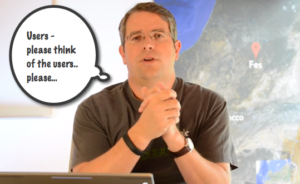
It’s not unusual for commentators to reference the imposing number of different variables there are in Google’s algorithms for search rankings.
And then, quite rightly, they advise everyone not to worry about the individual elements but to focus on the big lessons, like “don’t fret about keyword density, just write content that’s informative and relevant”.
As I say, all perfectly valid and, in my opinion, correct. There’s no point getting hung up on trying to reverse-engineer the algorithm – firstly, you’ll go mad and secondly, you’ll fail. Better to learn and understand what the algorithm is trying to tell you about how to behave and then optimise your website behaviour to fall into line.
Of course, understanding what the lessons are is easier said than done and however much you put the breadth of the factors involved to the back of your mind, you can’t help juggle them in your mind to quantify where your priorities should be. Right?
That’s why it is SO important to listen to the best commentators. The ones who’ve done their tours of duty, studying google down the years and the ones that have that knack of distilling simplicity from complexity.
Two key articles were published this week that demonstrated exactly these characteristics and whether you know your SEO onions or not, these articles will definitely help – either in setting you straight on how direct and indirect factors marry together or, at the very least, in helping you explain it to others (no marketer is an island and all that).
Firstly, there’s Rand Fishkin (you knew it had to be Rand), deconstructing why Brand isn’t a Google Ranking factor and yet at the same time why it’s so easy to correlate Brand with ranking success – a phenomenon I like to refer to as the Gravity of Brand. Factors within factors.

Secondly, there are a couple of reviews of the updated impact of social signals on rankings on Econsultancy and on SEW.
Both are good for clarification on the factors that make up other factors that lead to other factors that are probably central to Google’s assessment of authority (a topic Digital State Consulting have looked at in the past).
In most regards, we’re ultimately best advised to follow the same lessons for behaviour as we have before but things continue to change – it’s important to keep listening as these tectonic plates shift as one day there could be an earthquake.
Lastly, given that those two were a bit high-level and heavy, I’ve got a nice infographic from State of Digital on the red lines in SEO. Looks like there’s a lot of things flagged but, as I’ve already said, these sorts of variables generally underpin best practice advice. Follow the path, stay off the moor.



